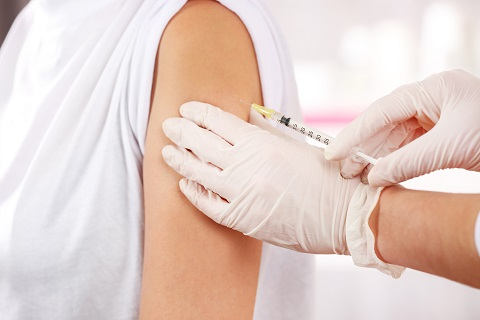For How long does the Shingles Vaccine Last?
 What is shingles? Who can get it? And for how long does the shingles vaccine last? You have questions, we have answers. Keep reading below!
What is shingles? Who can get it? And for how long does the shingles vaccine last? You have questions, we have answers. Keep reading below!
What is Shingles?
Shingles is a viral infection of a nerve and the area of skin connected to that nerve. It's caused by the varicella-zoster virus which is the same virus that causes chickenpox. Common symptoms of shingles include severe pain and a red rash that can appear as a single stripe of blisters along your torso, chest, or face. You can also experience burning, numbness, or tingling, as well as itching. Anyone who's had chickenpox can contract shingles. After you recover from chickenpox, the virus can enter the nervous system and lie dormant for years. Shingles occurs when this virus reactivates and travels along your nerves to your skin.
While it isn't completely clear as to what causes the virus to reactivate, a lowered immune system due to old age could be a factor.
According to Medicine Net, stress can also weaken your immune system. If your stress levels are through the roof, be sure to follow these tips to put a stop to stress.
Anyone who's had chickenpox can contract shingles. After you recover from chickenpox, the virus can enter the nervous system and lie dormant for years. Shingles occurs when this virus reactivates and travels along your nerves to your skin.
While it isn't completely clear as to what causes the virus to reactivate, a lowered immune system due to old age could be a factor.
According to Medicine Net, stress can also weaken your immune system. If your stress levels are through the roof, be sure to follow these tips to put a stop to stress.
Who can Get Shingles?
While shingles can occur at any age, your chances increase as you get older—especially for those 50 years or older. Shingles is also more common for those with weaker immune systems. Shingles itself cannot be passed from one person to another [1]. However, the virus that causes both chickenpox and shingles can be spread from someone who has the shingles rash to someone who's never had chickenpox. In this event, the person who contracts the virus (upon contact with fluid from the blisters resulting from shingles) could then develop chickenpox. However, he or she won't have a shingles outbreak. While shingles isn't as contagious as chickenpox, it's advisable to avoid contact with infants, pregnant women who've never had chicken pox, and those with weaker immune systems. The chance of spreading the virus is also much lower if the rash and blisters are covered.For how long does the Shingles Vaccine Last?
 The shingles vaccine is a one-shot vaccine and is available to people 50 years or older. It lasts for approximately 5 years. Even so, it "still lowers the risk of shingles by 21 percent" [2].
As per the recommendation of the CDC, those who are 60 years or older should consider getting one dose of the shingles vaccine [3]. There is also no maximum age limit for the vaccine.
Those who've already had shingles can still get the shingles vaccine. Although shingles typically only occurs once, there is a slight chance that it could reoccur.
Some common shingles vaccine side effects include redness, soreness, swelling, or itching at the site of the injection. While not as common, headaches can also occur.
Those who have weakened immune systems due to immune-suppressing medications or illnesses may not be eligible for receiving the vaccine.
The shingles vaccine is a one-shot vaccine and is available to people 50 years or older. It lasts for approximately 5 years. Even so, it "still lowers the risk of shingles by 21 percent" [2].
As per the recommendation of the CDC, those who are 60 years or older should consider getting one dose of the shingles vaccine [3]. There is also no maximum age limit for the vaccine.
Those who've already had shingles can still get the shingles vaccine. Although shingles typically only occurs once, there is a slight chance that it could reoccur.
Some common shingles vaccine side effects include redness, soreness, swelling, or itching at the site of the injection. While not as common, headaches can also occur.
Those who have weakened immune systems due to immune-suppressing medications or illnesses may not be eligible for receiving the vaccine.
Effectiveness of the Shingles Vaccine
Since the one-time vaccine lasts for about 5 years, most doctors recommend getting the vaccine at 60 years or older. However, the shingles vaccine poses a slight conundrum. The risk for shingles increases with age but the effectiveness of the shingles vaccine decreases with age too. According to Zostavax's research (the company that makes the vaccine), the vaccine reduces the risk of developing shingles by half for those in their 60s. Between ages 70 to 79, the vaccine is 41% effective. And for those who are 80 or older, the effectiveness drops below 20% [4].Final Word
While the effectiveness of the vaccine does drop with age, do consider the risks of complications due to a shingles outbreak. According to Dr. Jeffrey I. Cohen, "the older you are when you get shingles, the more likely you are to develop pain that persists after the rash has resolved."[5] This is also called postherpetic neuralgia which can be extremely debilitating and can last for years. Other complications can include vision loss if shingles occurs around an eye, as well as neurological problems like facial paralysis or hearing problems. With this in mind, if you are considering getting the vaccine, it's best to speak with your healthcare provider to determine the best time to get vaccinated.IMPORTANT NOTE: The above information is intended to increase awareness of health information and does not suggest treatment or diagnosis. This information is not a substitute for individual medical attention and should not be construed to indicate that use of the drug is safe, appropriate, or effective for you. See your health care professional for medical advice and treatment.